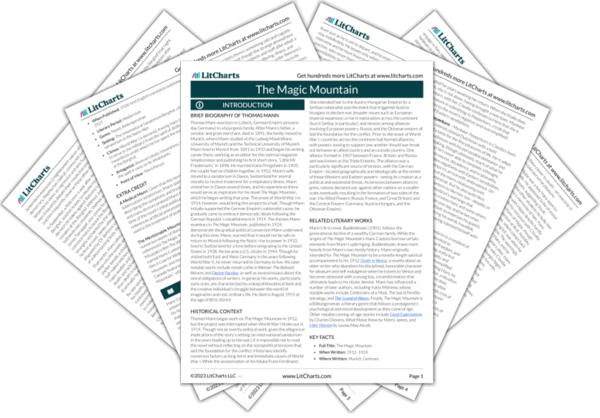In The Magic Mountain, thermometers symbolize Hans’s initiation into the Berghof’s culture of illness, idleness, and irrationality. When Hans first arrives at the Berghof, the pervasive presence of illness he discerns there deeply unsettles and confuses him. However, he finds residents’ calm acceptance of their situation even more baffling. He struggles to rationalize and accept how the seriously ill can go about their days laughing, feasting, and acting as though everything is completely normal when the threat of death looms menacingly over their heads. This puzzling acceptance of illness and death comes through most strikingly for Hans in the meticulous taking and recording of one’s temperature, an act all residents carry out as casually and regularly as he indulges in his Maria Mancini cigars—indeed, Dr. Behrens even jokingly refers to a thermometer as a “mercury cigar.”
But as Hans spends more time at the Berghof, he becomes acclimated to its environment, and he eventually begins to see the idle, aimless, and irrational existence of a resident as an alluring escape from the chaotic and stifling social norms of ordinary society. As he undergoes this process of acclimatization, he gradually loses his taste for his Maria Mancinis, signifying his growing alienation from the ordinary world outside the Berghof. Eventually, his cigars bring him no pleasure at all, and this signals his complete disassociation from his old life and its stifling bourgeois social norms. When he finally buys a thermometer from the head nurse and uses it to take his temperature—an act he carries out voluntarily—it signals his choice to disavow the stifling, bourgeois social norms of his old life and give in to the allure of the illness and death as an alternate path toward meaning and self-knowledge.
Thermometers/Cigars Quotes in The Magic Mountain
“You said ‘actually.’ But ‘actually’ doesn’t apply,” Hans Castorp responded. He was sitting with one thigh hiked up on the railing; the whites of his eyes were bloodshot. “There is nothing ‘actual’ about time. If it seems long to you, then it is long, and if it seems to pass quickly, then it’s short. But how long or how short it is in actuality, no one knows.” He was not at all used to philosophizing, and yet felt some urge to do so.
Joachim contested this. “Why is that? No. We do measure it. We have clocks and calendars, and when a month has passed, then it’s passed—for you and me and everyone.”















